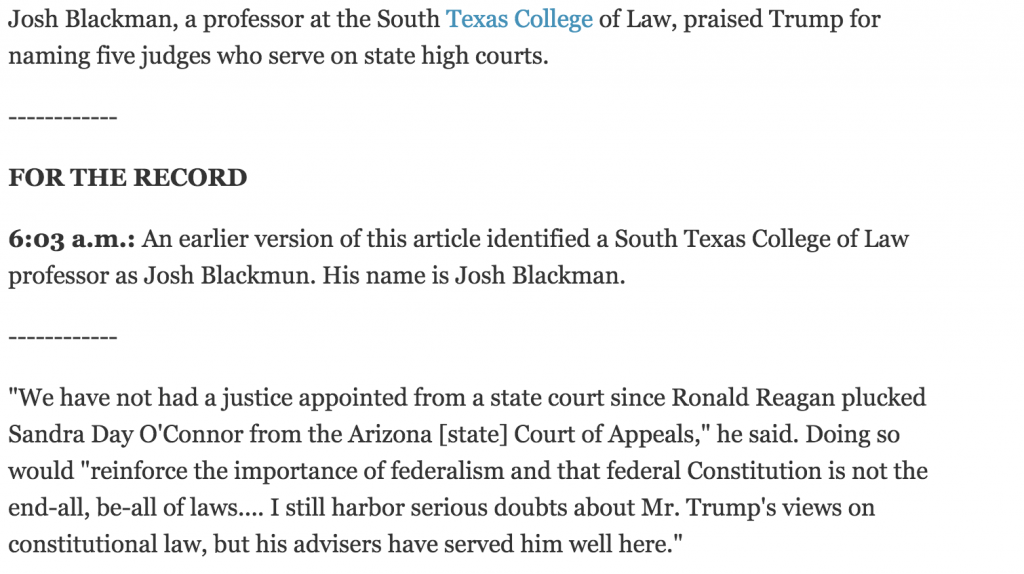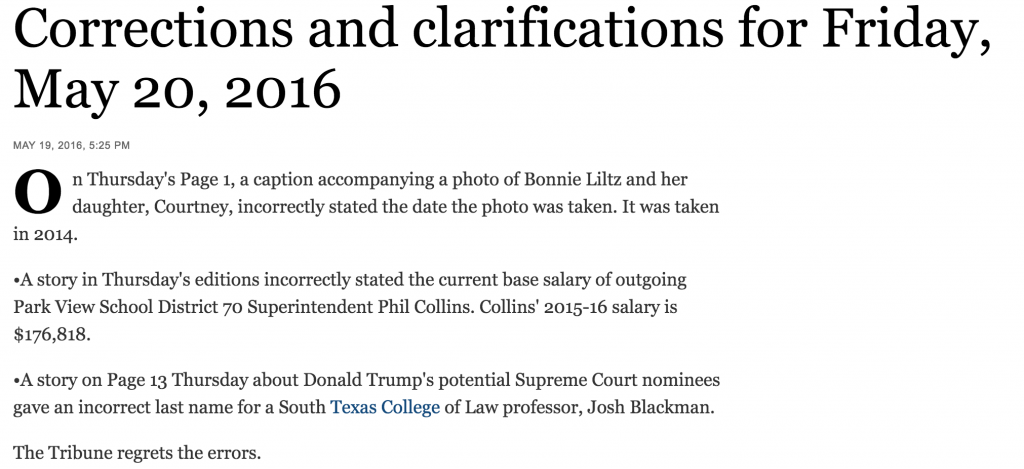In National Review, I write that Trump’s SCOTUS shortlist gets two cheers–my guarded optimism is due to the fact that his announcement was equivocal of whether he would actually stick with this list. As for the first two cheers, the selections are important for four main reason.
First, his list of potential nominees did not all receive their law degrees in Cambridge, Mass., or New Haven, Conn.Second, Trump did not limit his search to the usual inside-the-beltway favorites. Third, for the first time in a generation, not a single judge from the D.C. Circuit Court of Appeals — often called the second-highest court in the land — made the Supreme Court shortlist.Fourth, this geographic diversity also instills a respect for the principles of federalism: Not all of the answers to our problems will come from the seat of the central government, many will come from the “laboratories of Democracy” in the several states.
Here is the introduction:
In his dissent in last summer’s same-sex marriage case, Justice Antonin Scalia lamented that the Supreme Court is “hardly a cross-section of America.” The problem, Scalia wrote, is that the most serious questions of constitutional law are resolved by a “strikingly unrepresentative” group of attorneys from elite circles. Donald J. Trump’s list of eleven potential nominees to the Supreme Court would fix that problem. Rather than focusing on the usual shortlist of well-credentialed jurists who live along the Amtrak corridor between Boston and D.C., Trump cast a wider net to provide better representation of our constitutional culture. I have expressed my serious doubts about Mr. Trump’s vision of constitutional law, but so long as he sticks with this list, I remain cautiously optimistic.
And here is my conclusion, which sounds a note of caution:
But I must temper my optimism with a note of caution: Mr. Trump stopped short of guaranteeing that he would pick someone from this list. In March, he unequivocally promised, “I will pick, 100 percent pick” from the list. Now, he would only say that these jurists will serve as a “as a guide to nominate our next” justice, and that the list was “representative of the kind of constitutional principles I value.” I have expressed my serious doubts about Mr. Trump’s vision of constitutional law, and this equivocal language leaves me doubting more. For now, I can only give it two cheers. If Mr. Trump wants the third cheer, he must convince us that this will not end up as a “If you like your justices, you can keep your justices” promise. This must be a promise to keep.
Indeed, after the article went to press, Trump last night tweeted that he may add new names.
This is the sort of thing that weakens any confidence I have that he will stick with his promise.
On the third point, I was struck by Politico’s interview of Larry Tribe, among others, who were surprised by Trump’s decision not to pick the usual suspects, including Judge Kavanaugh or Paul Clement
While Trump’s list pulled in five judges from various state supreme courts, he passed over some of those long considered top contenders for any future Republican Supreme Court pick, like 6th Circuit Judge Jeffrey Sutton, D.C. Circuit Judge Brett Kavanaugh and former Solicitor General Paul Clement.
“The missing names … are even more interesting than the names on the list,“ said Harvard Law Professor Laurence Tribe, once considered a top Supreme Court possibility for Democrats.
Trump’s judicial roster includes a bevy of rock-ribbed conservative jurists, many of whom have résumés in Republican politics, ties to The Federalist Society and mentors among the most conservative figures on American courts. But it’s a list designed more to limit any blowback from conservative politicians than to identify a successor to the late Justice Antonin Scalia, a bracing intellectual who dominated conservative legal thinking during his three decades on the court.
With all respect to Larry Tribe, the last time he recommended a Republican nominee to the Supreme Court was in 1987, when he used every ounce of his ability to oppose Robert Bork–a conservative legal giant from the D.C. Circuit. He then turned around to endorse a Sacramento Republican, Anthony Kennedy, whom he knew would overturn Bowers v. Hardwick. Tribe is estopped from offering any comments on the credentials Republican nominees.

